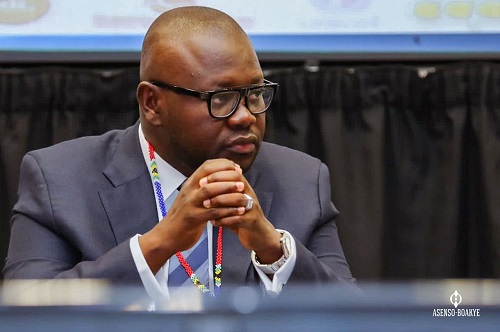
The Minister of Works and Housing, Francis Asenso-Boakye, says Ghana is planning to upgrade existing slums, and prevent the emergence of new ones, to ensure that people live in habitable conditions.
He said this would be achieved through coherent and integrated national urban and housing policies, which prioritises the implementation of national developmental plans, policies, and result-oriented programmes and projects for slums.
“Ghana has taken the bold step in the development of a draft Slum Upgrading and Prevention Strategy, following the country’s active participation in the implementation of Phases 1 and 2 of the “Participatory Slum Upgrading Programme (PSUP)” and the emergence of this Global Action Plan will help shape our strategy for effective implementation,” Mr Asenso-Boakye said.
He was speaking at a high-level meeting, to launch the Global Action Plan Framework on Informal Settlements and Slums, in Pretoria, South Africa.
It was organised by the United Nations Human Settlements Programme (UN-Habitat) and the government of South Africa.
The meeting brought together ministers, top government officials, as well as civil society groups that focused on the upgrading and transforming of informal settlements.
The importance of the Global Action Plan Framework on Informal Settlements and Slums, Mr Asenso-Boakye noted, could not be over-emphasised as it would consolidate, and amplify the world’s collective resolve to accelerate the implementation of the Sustainable Development Goals (SDGs), and the New Urban Agenda (NUA).
The Executive Director of the UN-Habitat, Ms Maimunah Mohd Sharif, lauded various governments for their resolve towards upgrading of existing and prevention of slums.
She noted that the meeting would see to the launch of a Global Action Plan Framework, to transform Informal Settlements and Slums in the Decade of Action, accelerating the implementation of the SDGs and NUA and leverage the momentum of the Urban October and the preparation process for the UN-Habitat Assembly in June 2023.
The Global Action Plan Framework Initiative, Ms Sharif explained was anchored on the Slums and Informal Settlements Network (SiSnet) and launched during Habitat III in Quito, as part of the global Participatory Slum Upgrading Programme (PSUP), initiated by the Organisation of the African, Caribbean and Pacific States (OACPS), financed by the European Commission and implemented by UN-Habitat.
She said the Global Action Plan Framework was informed by the co-creation of a global publication in search of solutions to the challenges of informal settlements and slums.
“The publication provides a snapshot of the current global status quo of slums and informal settlements reflects on lessons learnt in the past 20 years and identifies sustainable and inclusive solutions for transforming informal settlements and slums,” Ms Sharif stated.
The objective of the Global Action Plan Framework is to take coordination, collaboration, commitments and partnerships to the next level and further provide a joint vision to inform actions framed by partnerships.
It is the basis for member states to elevate commitments in the form of a resolution to be pledged in the UN-Habitat Assembly process.
BY TIMES REPORTER







